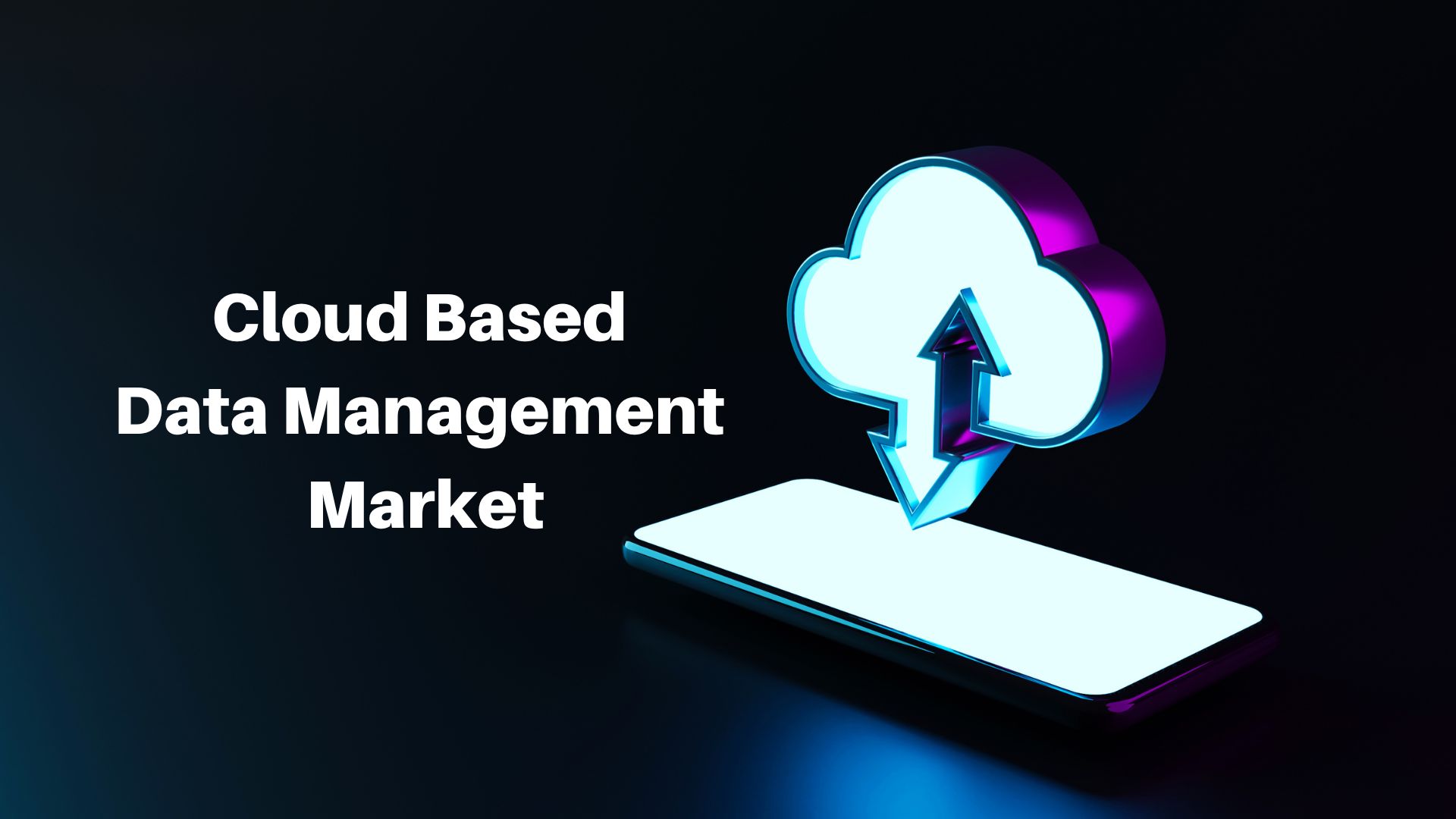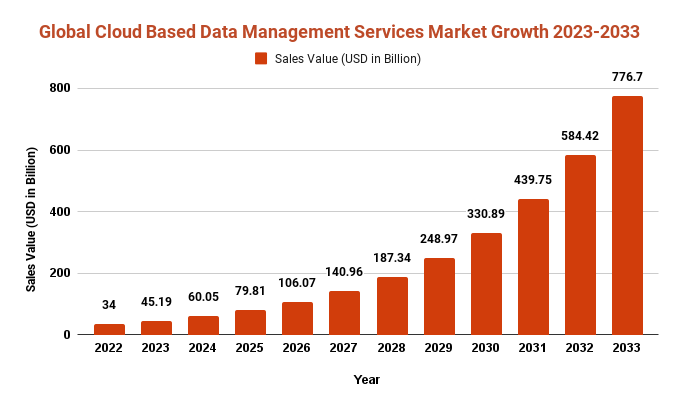Cloud Based Data Management Services Market Size is expected to reach USD 776.7 Bn by 2033

Page Contents
Market Overview
Published Via 11Press: Cloud-based data management services market offer users the capability to store, manage and access their information online. These solutions give businesses and individuals alike an opportunity to take advantage of cloud advantages like scalability, accessibility and cost efficiency for all their data management requirements.
The Cloud Based Data Management Services Market size is expected to reach USD 776.7 Bn by 2033, up from its current value of USD 34 Bn in 2022, growing at an annual compound growth rate (CAGR) of 32.9% from 2023-2033.
Key Features:
- Scalability: Cloud-based data management services enable users to scale their storage and management requirements up or down as needed, without needing large upfront investments in hardware or infrastructure. This enables businesses to adjust capacity according to changing business demands without incurring large financial obligations.
- Accessibility: Cloud-based data management services can be accessed anytime, from any location as long as there is an internet connection. This makes it simple for users to collaborate on data management tasks regardless of their physical location.
- Security: Cloud-based data management services offer robust security measures to guard against unauthorized access, data breaches and other threats. These may include data encryption, access controls and monitoring tools.
- Integration: Many cloud-based data management services can be integrated with other business tools and applications, such as CRM systems, project management tools, and accounting software. Doing so helps simplify workflows and boost productivity levels.
- Cost Efficiency: Cloud-based data management services typically offer a pay-as-you-go pricing model, so users only pay for the storage and processing capacity they use. This can be more cost-effective than investing in on-premise hardware or infrastructure.
- Popular cloud-based data management services include Amazon Web Services (AWS), Microsoft Azure, Google Cloud, Dropbox and Box.
Key Takeaways
- Cloud-based data management services enable users to store, manage, and access their information over the internet for increased scalability, security, integration, and cost efficiency.
- Users can scale their storage and processing capacity according to changing business needs without investing in costly upfront hardware or infrastructure upgrades.
- Cloud-based data management services provide robust security measures, such as data encryption, access controls and monitoring tools.
- These services can be integrated with other business tools and applications to streamline processes and boost productivity.
- Popular cloud-based data management services include Amazon Web Services (AWS), Microsoft Azure, Google Cloud, Dropbox and Box.
- Cloud-based data management services have become increasingly popular due to their convenience, adaptability, and cost effectiveness – making them a great resource for both businesses and individuals looking to manage their data efficiently.

Do Inquiry Before Purchasing Report Here: https://marketresearch.biz/report/cloud-based-data-management-services-market/request-sample/
Regional Snapshot
Cloud-based data management services are becoming increasingly popular around the world, with adoption rates varying by region.
- North America: North America is one of the biggest markets for cloud-based data management services, boasting a high adoption rate among businesses of all sizes. This market is dominated by major cloud providers such as Amazon Web Services, Microsoft Azure and Google Cloud.
- Europe: Europe is a major market for cloud-based data management services, boasting an impressive adoption rate among businesses there. Major cloud providers such as Amazon Web Services, Microsoft Azure and Google Cloud are active here too.
- Asia-Pacific: The Asia-Pacific region is seeing a meteoric rise in cloud data management services, spurred on by an expanding adoption of cloud technology across the region. Major cloud providers are expanding their offerings here as well as local players making waves.
- Latin America: Cloud-based data management services are seeing a surge in adoption throughout Latin America, with businesses increasingly turning towards these solutions. Amazon Web Services, Microsoft Azure and Google Cloud are all active players on this market.
- Middle East and Africa: The Middle East and Africa region is rapidly becoming a hub for cloud-based data management services, with significant increases expected over the coming years. Major cloud providers are also expanding their operations here.
- Overall, cloud-based data management services are becoming more and more popular around the world as businesses search for efficient and cost-effective ways to manage their data. Due to their flexibility and scalability, it is expected that adoption rates will continue to rise across all regions.
Drivers
- Scalability and flexibility: Cloud-based data management services provide high levels of scalability and flexibility, enabling businesses to rapidly adjust their storage and processing capacity as needs shift. This makes managing fluctuating workloads simpler as well as adapting business objectives.
- Cost-Effectiveness: Cloud-based data management services can be more cost-effective than traditional on-premise solutions, since they require no large upfront investments in hardware and infrastructure. Businesses instead pay for the storage and processing capacity they require on a pay-as-you-go basis.
- Accessibility: Cloud-based data management services are accessible anytime, as long as there's an internet connection. This makes it simple for businesses to collaborate on data management tasks and access their data from multiple devices and locations.
- Security: Cloud-based data management services offer robust security measures to guard data against unauthorized access, breaches and other threats. This can provide businesses with greater peace of mind, particularly those handling sensitive or confidential data.
- Integration: Cloud-based data management services can be seamlessly integrated with other business tools and applications, such as CRM systems, project management applications, and accounting software. Doing so helps simplify workflows and boost productivity levels.
- Innovation: Cloud-based data management services are rapidly developing, adding new features and capabilities at an accelerating pace. This enables businesses to take advantage of cutting-edge technology without needing significant investments in hardware or infrastructure.
Restraints
- Dependency on internet connectivity: Cloud-based data management services require an internet connection in order to access data and perform tasks. Any disruptions in connectivity could prevent access to this vital information, potentially disrupting business operations.
- Security Considerations: While cloud-based data management services typically implement robust security protocols, there remains the potential risk of data breaches and unauthorized access. This poses a particular concern for businesses handling sensitive or confidential information.
- Compliance Requirements: Certain industries, such as healthcare or finance, have stringent compliance regulations which could restrict what cloud-based data management services they can use. Businesses must ensure that the service they select satisfies these criteria.
- Vendor Lock-in: Once a business has invested in one cloud-based data management service, switching to another provider can be challenging and expensive. This limits flexibility and poses an issue for those wanting to avoid becoming bound to one vendor.
- Integration Challenges: Cloud-based data management services can be easily integrated with other business tools and applications; however, integration may still present difficulties for those businesses wishing to guarantee seamless connectivity across all systems. This poses a concern for those seeking to ensure seamless operation across their operations.
Opportunities
Cloud-based data management services offer businesses greater agility, allowing them to quickly scale up or down as necessary depending on their business requirements. This enables companies to react more rapidly to shifting market conditions, customer demands, and other elements.
- Improved Collaboration: Cloud-based data management services make it possible for teams to work together more efficiently on data management tasks, regardless of their location. This can enhance productivity and efficiency as well as promote better communication and teamwork between members.
- Better Insights: Cloud-based data management services offer businesses greater insight into their data, allowing them to make more informed decisions. This could result in improved business performance, customer satisfaction levels and profitability.
- Competitive Advantage: Businesses that adopt cloud-based data management services can gain an edge over their peers by being more agile, efficient and responsive. This helps them stand out in the marketplace and attract more customers.
- Innovation: Cloud-based data management services are continually growing and improving, with new features added regularly. This enables businesses to stay abreast of technological advancements and stay ahead of their competition.
- Cost Savings: Cloud-based data management services can help businesses cut expenses by forgoing large upfront investments in hardware and infrastructure. Instead, companies can pay for storage and processing capacity on a pay-as-you-go basis , enabling them to manage their budgets more effectively.
Challenges
Businesses should be mindful of several potential challenges when using cloud-based data management services:
- Data Security: One of the primary challenges with cloud-based data management services is guaranteeing data security. Businesses must ensure that whichever cloud-based service provider they select has robust security measures in place to guard against unauthorized access, breaches, and other threats.
- Data Integration: Cloud-based data management services present another challenge when it comes to data integration. Businesses must ensure their chosen service is compatible with their existing systems and allows for seamless integration of their data sources.
- Reliance on internet connectivity: Cloud-based data management services depend on reliable internet connection to ensure access to data and run business operations smoothly. Businesses must ensure they have a dependable internet connection in order to avoid any potential interruptions.
- Compliance Requirements: Certain industries, such as healthcare or finance, have stringent compliance regulations which may limit what cloud-based data management services they can utilize. Businesses must make sure the service they select satisfies these criteria.
- Cost Management: Cloud-based data management services are often billed on a pay-as-you-go basis, making cost management challenging. Businesses must ensure they have an accurate understanding of their data usage to avoid unexpected charges.
- Vendor Lock-in: Once a business has invested in one cloud-based data management service, switching to another provider may prove challenging and expensive. This limits flexibility and poses an issue for those wanting to avoid becoming locked into one vendor.
Market Segmentation
Application
- Public Cloud
- Private Cloud
- Others
End User
- BFSI
- Telecommunications and IT
- Retail
- Public Sector
- Others
model
- Software-as-a-Service (SAAS)
- Platform-as-a-Service (PAAS)
- Infrastructure-as-a-Service (IAAS)
Key Players
- IBM
- HP
- NetApp
- SAS
- Informatica Cloud
- Actian Corporation
- Cisco Systems Inc.
- Dell Technologies
- Fujitsu Ltd.
Report Scope
| Report Attribute | Details |
| Market size value in 2022 | USD 34 Bn |
| Revenue forecast by 2033 | USD 776.7 Bn |
| Growth Rate | CAGR Of 32.9% |
| Regions Covered | North America, Europe, Asia Pacific, Latin America, and Middle East & Africa, and Rest of the World |
| Historical Years | 2017-2022 |
| Base Year | 2022 |
| Estimated Year | 2023 |
| Short-Term Projection Year | 2028 |
| Long-Term Projected Year | 2033 |
Request Customization Of The Report: https://marketresearch.biz/report/cloud-based-data-management-services-market/#request-for-customization
Recent Developments
Recent advances in cloud-based data management services are worth noting:
- Increased Adoption of Hybrid Cloud Solutions: Businesses are increasingly turning to hybrid cloud solutions, which combine public and private cloud services, for their data management requirements. This trend is expected to continue, with more businesses turning towards hybrid cloud options for optimal security and flexibility.
- Greater Focus on Data Privacy: As data privacy becomes more and more of a priority, cloud-based data management service providers are taking steps to enhance their security measures and protect customer data. This includes implementing stricter authentication and encryption protocols as well as adhering to regulatory requirements.
- The rise of multi-cloud environments: Many businesses are turning to multi-cloud environments, which involve using multiple cloud providers for data management. This trend is expected to continue as businesses seek greater flexibility and resilience in their data management solutions.
- Increased Focus on AI and Machine Learning: Cloud-based data management service providers are increasingly incorporating artificial intelligence (AI) and machine learning (ML) capabilities into their offerings , helping businesses gain better insights from their data to inform decision making.
- Edge Computing in the Internet of Things: As the IoT expands, edge computing is becoming an increasingly important technology. Cloud-based data management service providers are developing solutions that can manage and analyze data at the edge, improving efficiency and responsiveness for IoT applications.
Key Questions
- What are cloud-based data management services?
Cloud-based data management refers to the utilization of cloud computing technologies for managing and storing data as well as performing various data-related tasks like integration, analysis, and visualization. - What are the advantages of cloud-based data management services?
Cloud-based data management services provide several advantages, such as increased agility, enhanced collaboration, insightful findings, competitive advantage, innovation potential and cost savings. - What are the challenges associated with cloud-based data management services?
Cloud-based data management services face numerous difficulties, such as data security and integration, dependencies on internet connectivity for storage and processing requirements, cost management issues and vendor lock-in. - What are the recent developments in cloud-based data management services?
Recent advancements include increased adoption of hybrid cloud solutions, increased attention paid to data privacy issues, multi-cloud environments becoming more common, increased investment in AI/machine learning capabilities and growth of edge computing capabilities. - How can businesses select the ideal cloud-based data management service to suit their requirements?
Businesses looking for the ideal cloud-based data management service should evaluate their specific data management needs, evaluate potential providers' capabilities and security levels, weigh the costs and advantages of each option, then select one that can fulfill all necessary specifications.
Contact us
Contact Person: Mr. Lawrence John
Marketresearch.Biz (Powered By Prudour Pvt. Ltd.)
Tel: +1 (347) 796-4335
Send Email: [email protected]
The team behind market.us, marketresearch.biz, market.biz and more. Our purpose is to keep our customers ahead of the game with regard to the markets. They may fluctuate up or down, but we will help you to stay ahead of the curve in these market fluctuations. Our consistent growth and ability to deliver in-depth analyses and market insight has engaged genuine market players. They have faith in us to offer the data and information they require to make balanced and decisive marketing decisions.



